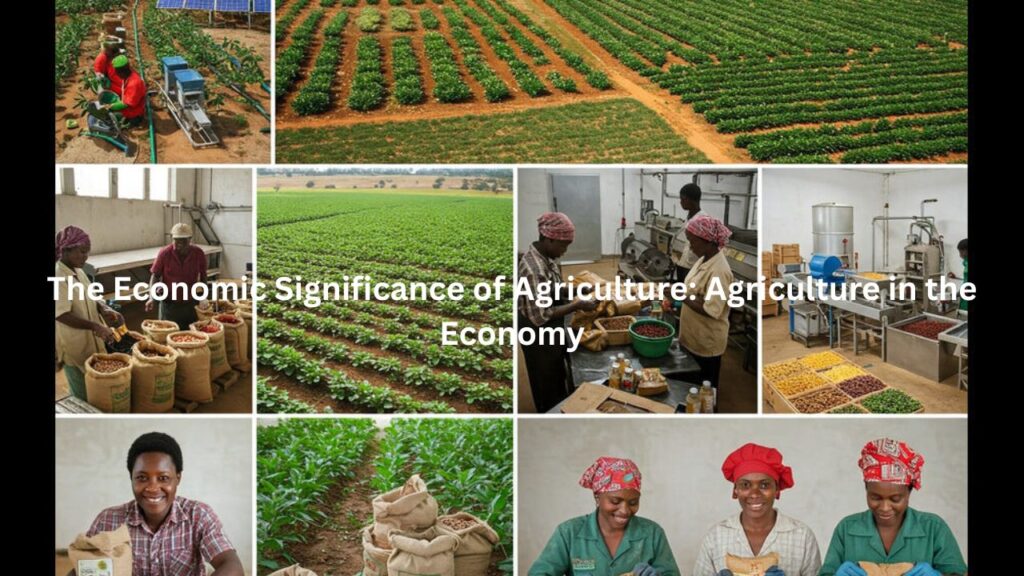Agriculture in the economy is fundamental in development country. Agriculture has long been recognized as the backbone of many economies, particularly in developing countries. It not only feeds the population but also plays a critical role in employment, trade, and economic development.
1. Agriculture: More Than Just Farming
Agriculture encompasses a broad range of activities beyond planting and harvesting crops. It includes livestock rearing, fisheries, forestry, agribusiness, and agro-processing industries. These components work together to provide raw materials, generate income, and support rural livelihoods.
In countries like Bangladesh, India, Nigeria, Ethiopia, and many parts of Southeast Asia and Sub-Saharan Africa, agriculture contributes a sizable portion to GDP and employs a large part of the workforce. Even in developed countries, agriculture remains vital for food production, rural development, and environmental conservation. Despite rapid industrialization and the growth of service sectors, agriculture continues to hold significant weight in shaping economic structures and ensuring sustainability.
2. The Economic Significance of Agriculture: Agriculture in the Economy
A. Contribution to GDP
In developing economies, agriculture contributes between 20% to 40% of Gross Domestic Product (GDP). It provides the base for industrial development by supplying raw materials such as cotton, jute, sugarcane, and tobacco.
For example, in Bangladesh, agriculture contributes around 13-14% to GDP but employs more than 40% of the labor force. In Sub-Saharan Africa, this figure can be even higher. Such numbers show how closely economic stability and agriculture are intertwined.
B. Employment Generation
Agriculture remains the largest employer globally. In rural regions, most people depend on farming and related activities for their livelihood. Smallholder farmers, particularly in Asia and Africa, are crucial in maintaining food supply and rural economic structure.
When agricultural productivity rises, it can reduce poverty significantly, especially in low-income countries. It also reduces the pressure on urban centers by curbing excessive rural-to-urban migration.
C. Food Security and Nutrition
Agriculture ensures a steady supply of food, which is essential for national stability and health. A strong agricultural sector means lower food prices, better nutritional standards, and less reliance on food imports.
In times of global crises, such as pandemics or wars, countries with resilient agriculture systems can better withstand supply chain disruptions.
D. Foreign Exchange Earnings
Agricultural exports play a major role in generating foreign exchange. Many countries export coffee, tea, spices, fruits, vegetables, grains, and livestock products to international markets.
For example:
- Vietnam and Colombia earn billions from coffee.
- Thailand and India dominate the global rice market.
- Kenya and Ethiopia earn large revenue from tea and horticulture.
These earnings can be reinvested into infrastructure, education, and healthcare

3. Modern Agriculture and Economic Transformation: Agriculture in the Economy
The modernization of agriculture—through mechanization, irrigation, fertilizers, and improved seed technology—has significantly boosted productivity. Governments and NGOs are now investing in sustainable farming methods, smart irrigation, organic farming, and agritech solutions to increase output while protecting the environment.
Digital platforms also help farmers access real-time weather data, pricing, and market opportunities. This creates a smarter and more efficient agricultural economy.
4. Agriculture and Rural Development: Agriculture in the Economy
Agriculture is a catalyst for rural development. A productive farming system can:
- Raise income levels
- Improve education through better earnings
- Enhance access to healthcare
- Increase infrastructure investments
When agriculture thrives, rural communities flourish—helping to reduce regional inequalities and boost national development.
5. Challenges Facing the Agriculture Economy
Despite its importance, the agricultural sector faces several challenges:
- Climate Change: Unpredictable weather patterns, floods, droughts, and rising temperatures are affecting crop yields and livestock.
- Land Degradation: Overuse of land and deforestation are reducing agricultural potential.
- Lack of Technology: Many farmers still use traditional methods, leading to low productivity.
- Market Access: Small-scale farmers often struggle to sell their produce at fair prices due to lack of infrastructure and market linkages.
- Finance and Credit: Access to affordable loans and insurance remains limited for rural farmers.
- Policy Gaps: Inconsistent agricultural policies, subsidies, and rural investment plans slow down sectoral progress.
6. Sustainable Agriculture: The Future of the Economy
To ensure agriculture continues to support the economy, sustainability must be prioritized. Sustainable agriculture involves:
- Crop rotation and organic methods
- Water-efficient irrigation
- Use of renewable energy in farming
- Reduction in chemical pesticide use
- Promoting agroforestry and biodiversity
By aligning agriculture with environmental goals, countries can secure long-term economic and ecological health.
7. Agriculture in the Digital Age: Agriculture in the Economy
Technology is reshaping the future of agriculture. GPS-based soil mapping, drones for field monitoring, AI-powered yield predictions, and blockchain for supply chain transparency are transforming the way farming operates.
Agri-tech startups are emerging across the world, offering digital solutions to traditional farming problems. With proper support, digital agriculture can:
- Boost productivity
- Reduce wastage
- Link farmers directly with buyers
- Predict and mitigate crop failure risks
This can revolutionize the agriculture economy and make it more resilient and profitable.
8. Conclusion: Agriculture Is the Foundation of Economic Development
Agriculture is more than a traditional livelihood—it’s a pillar of economic resilience, rural progress, and national prosperity. For economies to grow sustainably, especially in the Global South, agriculture must be protected, modernized, and invested in.
As global demand for food increases, climate challenges intensify, and population pressure mounts, agriculture will continue to play a decisive role in shaping the economic future of nations. A thriving Agriculture in the Economy means a stable society, a fed population, and a better world.

